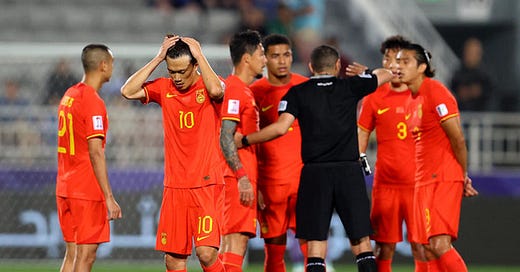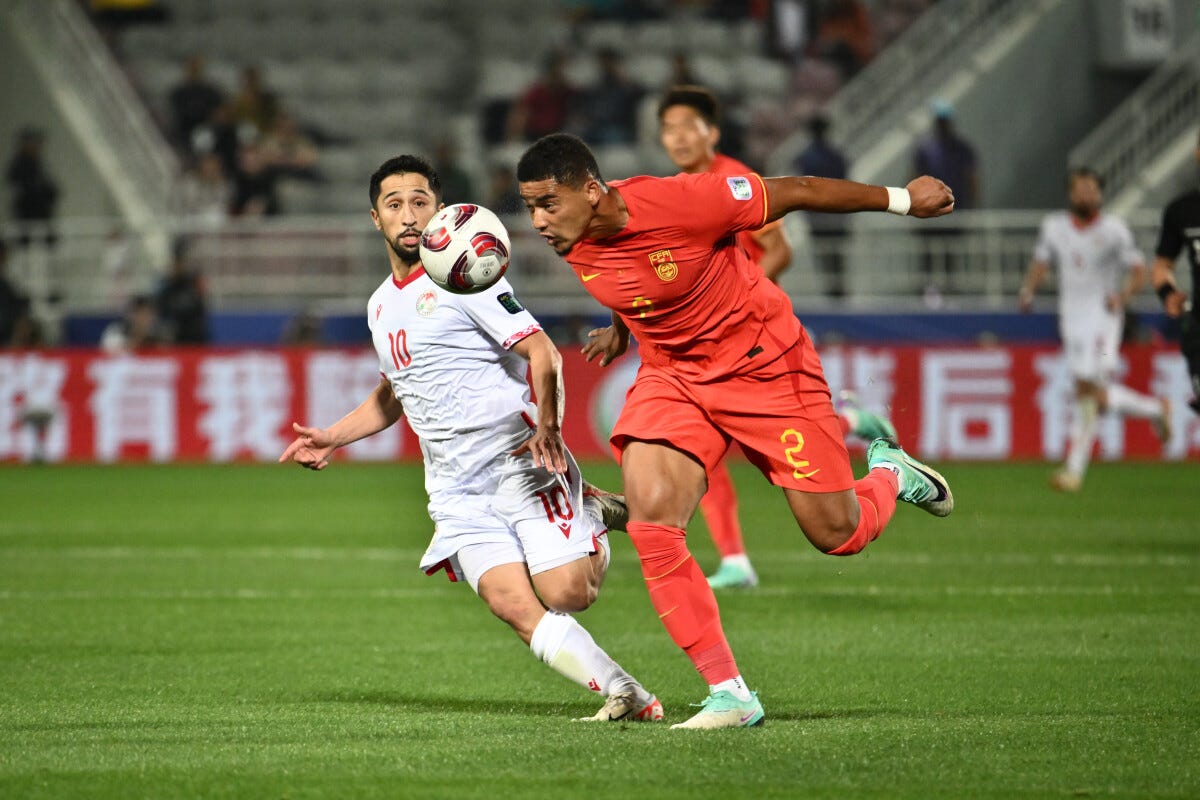Why are China so bad at football?
The Asian Cup has not started well for China as the country of 1.4 billion was second best to Tajikistan, a country with 1.39 billion fewer people.
China’s Asian Cup started Saturday with an entertaining but disappointing 0-0 draw against tournament debutants Tajikistan.
Just in case the Reds suddenly bounce back in Qatar to become continental conquerors in the next few days, now is the perfect time to look at one of Asian football’s classic questions which goes along the lines of –why do China consistently underachieve?
It’s all relative of course. Team Dragon should still get out of the group (only eight of the 24 teams fall at the first hurdle) but if expectations were low before —and they were— now they have sunk a little further.
Putting stuff like tactics and coaching decisions to one side, below are some of the medium to long-term issues that are commonly cited as barriers preventing a country that is a powerhouse in so many fields, from fulfilling its football potential
1–Playing Pool
Anyone who has ever thought, read or talked about Chinese football will be familiar with a phrase along the lines of ‘It is only a matter of time before they find 11 world-class players among the 1.4 billion’.
Problem is, not that many play the game. There was a statistic cited by every Chinese FA official you’d meet around 2010 which said there were 300,000 registered U-12 players in Japan while China, with ten times the population, had fewer than 30,000.
Walk around the big cities and kids playing table-tennis and basketball are a more common sight, and easier in terms of space too. There have been lots done to get youngsters kicking it about more and there are some small signs of improvement, much more time is needed.
2–COVID
The effects of the global pandemic should not be underestimated. China locked down first and longest, and, all in all, it lasted almost three years. As well as being a tough time for the country, it was hard for the players. In the first year or so, they were confined to hotels and stadiums. While the bubbles later become more flexible, it was a miserable time. Lots of foreign stars went home and some of those that wanted to return could not do so due to entry restrictions. This led to big Brazilian talents such as Paulinho and Anderson Talisca being released from contracts.
3–Financial problems
COVID added to this as clubs went for long periods with little to no revenue from ticket sales or broadcasters and income from sponsors and interest from fans took a nosedive too. There were already issues as the economic downturn that had hit China before the pandemic also had a major impact especially in the real estate sector –a huge issue in a league where most top tier clubs were backed by property developers.
Less money meant less quality and the focus for most Chinese Super League clubs was simply surviving, a mindset not conducive for long-term planning.
4-A Lack of overseas players
The Chinese squad at the Asian Cup is completely domestic-based. Some would say that the country’s player development system has been such in the past that clubs in the big European leagues are simply not interested.
South Korea and especially Japan are obviously out in front here but smaller Asian nations have been starting to send their players overseas whether it is to smaller European leagues or to elsewhere in Asia.
5-Culture
It has been suggested that Chinese culture plays a part in limiting participation and discouraging potential stars from pursuing a career in the beautiful game.
Traditionally, parents –who would have expected to end up relying on their eldest sons for support and care as they became old –wanted their boys to follow traditional and reliable careers such as law or medicine. In such households, hitting the books was much more of a priority than kicking a ball. Other Asian nations with similar backgrounds, such as South Korea for example, have performed better but then China also had, from 1980 to 2016, a one-child policy which, many think, exacerbated these family pressures.
6-Inconsistency, interference, incompetence and worse
Corruption has been a problem, from the nineties forward and even in recent months, high-ranking football officials have been prosecuted. Such scandals damaged the reputation of the Chinese game, and the love that fans had for it.
What feels like a constant changing of regulations, such as how many foreign players and U-23 players, clubs are allowed to sign or field, is another common complaint.




